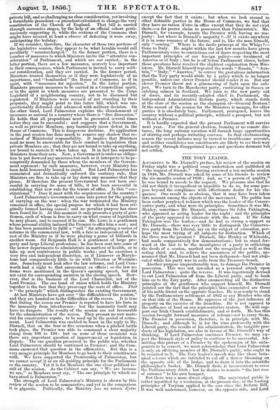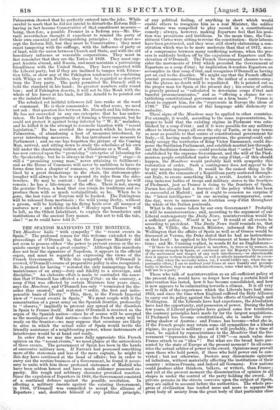.1 . 11b, TORY LEADER.
ACCORDING to Mr. Disraeli's preface, his review of the session on Friday night was a political essay undertaken and published at "the request of friends." Having reviewed a ten-months session in 1848, Mr. Disraeli was asked by some of his friends to review the six-months session of 1856; and, as " a person of quality_," he was bound to accede to the request. We presume also that he did not think it inexpedient or impolitic to do so, for some pur- pose beyond the compliance with affectionate desire for his elo- quence. One result is so obvious, that it may have been taken into account among the objects of the movement. The public has been rather perplexed to know which was the leader of the Conser- vative party, and what were its principles. Sometimes it was Mr. Henley, sometimes Mr. Disraeli, sometimes Sir John Pakington, who appeared as acting leader for the night ; and the principles of the party appeared to alternate with the men. If Sir John Pakington was the leader,—and, he had as strong a support as Mr. Disraeli,—there was very little to distinguish the Conserva- tive party from the Liberal, say on the subject of education, per- haps the most trying of all subjects for distinction. Which of the three was the greatest ? Disraeli, like Henley or Whiteside, had made comparatively few demonstrations ; but to stand for- ward at the last to be the mouthpiece of a party in criticizing the deeds of a session, marked out the recognized as well as the acting chief, and, to relieve the uneasiness of the public, an- nounced that Mr. Disraeli had not been dethroned—had not abdi- cated while his party was in exile from the Treasury-bench. Another purpose unquestionably was, to damage the Premier in possession. This was not intended as a personal attack upon Lord Palmerston; quite the reverse. It was ingeniously devised to cut Lord Palmerston off from the Liberal party, and. to hook him on to the Tory party. After enumerating all !the distinctive principles of the gentlemen who support himself, Mr. Disraeli pointed out the fact that the principles thus enunciated are those of his noble friend on the opposite benches. He is as ready to stand by the Parliamentary settlement of 1832 as any Member who sits on that side of the House. He approves of the just influence of property on the exercise of the franchise. He is not opposed to the influence of land on our representative system. He will sup- port our Irish Church establishments, and so forth. He has this session brought forward measures of reform—not to carry them. The Premier in possession therefore is in principle with Mr. Disraeli ; and although he is for the time professedly with the Liberal party, the results of his administration the tangible pro- ducts of his legislation, are also in favour of 31;. Disraeli's way of thinking. If Lord Palmerston continues Premier, we may ex- pect the Disraeli style of policy to continue to be successful. Ad- mitting this picture of a Premier by the spokesman of his anta- gonists to be correct, we must acknowledge that Lord Palmerston is only an off-lying member of Mr. Disraeli's party, who ought to be reunited to it. The Tory leader's speech was like those bota- nical scissors which are intended to cut off a flower blooming on the opposite side of the hedge, and to draw it into the scientific philosopher's basket. Mr. Disraeli finds it inconvenient to cross the Parliamentary ditch ; but he desires to reunite "the last rose of summer" to his own bouquet. But there was a more direct object. The uninitiated public is rather mystified by a recitation, at the present day, of the leading principles of Toryism applied to the cera since the Reform Bill. It was well understood, however, on the opposite side, and Lord
Palmerston showed that he perfectly entered into the joke. While careful to mark that he did not intend to disturb the Reform Bill— having in fact become Conservative of that constituent measure— being, then fore, a possible Premier in a Reform fera—Mr. Dis- raeli nevertheless thought it expedient to remind the party of their own essential and distinguishing principles : they must ac- cept the Reform Bill, but the must be Conservative ; they must
resist tampering with the e with the influence of party or of land, with the union between Church and State, and with the old hereditary influence or venerable corporations. They must in fact remember that they are the Tories of 1829. They must sup- port Austria abroad, and Russia, and must maintain a patronizing friendliness with the United States. They have coquetted with the Liberal party, but if they are inclined to tamper with Educa- tion bills, or show any of the Pakington tendencies for combining with Whigs or with Peelites, they must be regarded as deserters from the Tory party. The party permitted Mr. Disraeli still to hold the standard in his hand ; its greatest numbers rally round him ; and if Pakington deserts, it will not be like Monk with the whole of his forces at his back, but like Arnold to be pointed out as the isolated traitor.
The rebuked yet faithful followers fall into ranks at the word of command. He is their commander. On what score, we need not ask : that question lies between Mr. Disraeli and his followers. He has not succeeded in any one enterprise that he has under- taken. He had the opportunity of forming a Government, but he could not protect it against being infected by " W. B." maladies, and he killed it in the attempt to reconcile taxation with "recent legislation." He has avoided the reproach which he levels at Palmerston, of abandoning a host of measures introduced, by never introducing measures. He has introduced one measure to Parliament ; and no one has forgotten the picture of the Coming Man, arrived, and sitting down to study the schedules of his own bill under the chastening tuition of a Gladstone or a Wood. He has now entered upon the " promising '' enterprise of labouring for the Speakership : but he is always in that " promising " stage—is still a "promising young man,'' never attaining to fulfilment ; and as the House of Commons will never be ambitious to have its forms done into a chapter of romance, or its transactions drama- tized by a great dramaturge in the chair, the statesman-phi- losopher will always be free to expound its rules from the side- benches. He may be content : head of the Tory party he will remain ; he has a life-tenure of the office. There is not, among the genuine Tories, a head that can retain its traditions and. re- produce them with so much verisimilitude as he. When he is gene, the last voice of Toryism will be hushed. The Pakingtons will be released from mortmain ; the wild young Derby, without a groom, will be kicking up his flying heels over all manner of pastures new ; and white-headed Henley upon Thames" will be left, as the Oldest Inhabitant, to explain the boundaries and. institutions of the ancient Tory manor. But not to tell the tale, alas ! "as he could have told it."



































 Previous page
Previous page